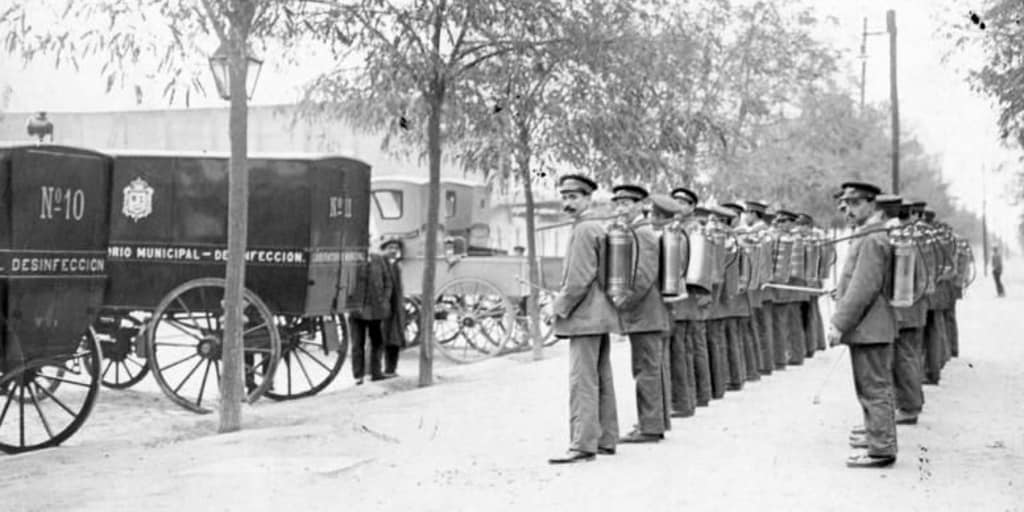In mid-May 1918, coinciding with the Feast of San Isidro, the people of Madrid suffered from a severe influenza epidemic that later became known as the “Spanish Flu”. Several outbreaks occurred and measures were taken to prevent their spread. Madrid City Council issued two orders, one in June and another in October, imposing measures such as avoiding crowds, maintaining strict physical and household hygiene or using masks. There is nothing new under the sun, so we planned to set up an epidemic hospital. Water bodies have also been disinfected, as have passengers.
Because of his fall, even King Alfonso, of course, clarified that “the illness that afflicts His Majesty is very benign and not important at all.”
The chronicle added that the disease spread through “state agencies, municipalities, official and private entities” and affected “public services” since “most of those responsible for the performance of public services suffer from unavoidable diseases”.
Of course the information is there. For example, the city laboratory explained in a note that “bacteriological examination of large volumes of sputum from persons affected by epidemic diseases revealed no microbial species other than those usually found in the oral cavity, pharynx and first tract. Other microbial species.” Respiration.
But due to the severity of the disease and the number of people affected, the situation became so serious that pharmacies decided not to close at 10pm but to stay open in order to continue serving the people. On the other hand, theaters had to close, in many cases because of the illness of actresses: “Apollo suspended its performances last night due to the unwellness of Rafaelita Leones, and that of her sister Rosario The show goes on.” In “Novedades”, the newspaper said, “Evil on the one hand and the lack of strength of the cartel on the other forced the company to end the official season.”
And just like that, October arrived, and with it the second wave. Mayor Luis Silvela advised journalists to “pay attention to hygiene: disinfect the sewers, pour a large amount of calcium chloride into them.” In private houses, disinfection continued: only on October 21, 1918, A total of 1,232 disinfections were carried out.
They are not the only weapons in this unequal battle: by order of the mayor’s office, water arriving at two disinfection stations below the old aqueduct of Alcubilla and Abronigar is also treated with ozone. From there it is supplied to fountains in areas such as Plaza San Juan, Mesón de Paredes, Plaza de Lavapiés, Cerrillo del Rastro, Puerta Cerrada, Plaza de la Cruz Verde, Campo del Moro or Paseo de la Virgen del Puerto, among others ,a lot of. The most modern trams were not equipped with fans, so fans were ordered to be installed urgently to ventilate the interior.
The flu affected not only the capital but also surrounding towns. As is happening now, it was also what happened at the beginning of the last century when there was a shortage of doctors: “Given the lack of initiative from doctors to assist the province’s poor towns, the provincial government’s health inspectors have been out inspecting,” ABC reported. “Inspections were carried out in the towns of Canilejas, Torrejon de Aldos, Camporeal, Calabanha, Brea, Etremela and Arganda.” Corrective measures; “The Absolute Isolation of the Convent of Salesias in Caniejas” was quoted in the press, Dr. Torrejon de Aldos was praised for his dedication, and the town “guaranteed that between eight and ten There will not be any sick “people” for days; Caravagna was hit hard, “about 200 people were sick and many more were attacked”; the epidemic hit Etremela and Brea, “a large number of people were affected Attacks, some of which were in very serious condition, Dr. Etremela deserves praise for his actions, he did not rest for a moment to help his patients.”
What is curious and shocking from a 21st century perspective are the measures taken against tourists from other countries. More specifically, it is to “prevent these travelers from exacerbating the health situation in this part of the peninsula through contagion.” That is: they are not allowed to get off the bus and remain quarantined at the hub until they board a train to Portugal.
But the measures so carefully ordered do not seem to have been implemented with the same resoluteness: “Today, groups of ragged Portuguese, laden with suitcases and bedrolls, paraded through the streets of the Courthouse, attracting a lot of attention from their neighbours,” he said . The chronicler also noted that these groups “passed through the most central parts of Madrid, even through the Puerta del Sol” while “no measures were taken by any of the authorities to prevent such a dangerous procession”.

